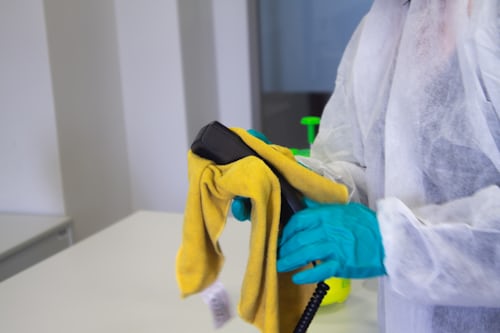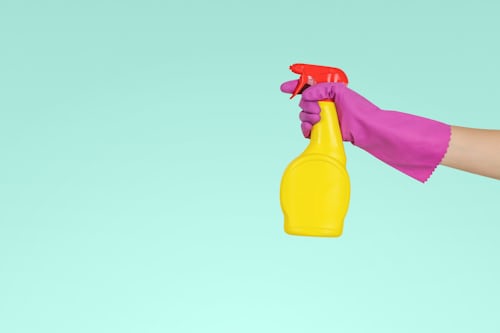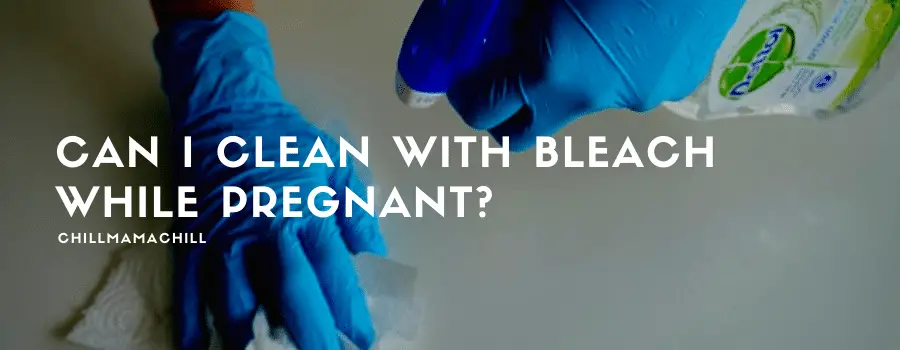‘Can I clean with bleach while pregnant?’ This is a common question among expecting women. After all, when pregnant, you need to do everything possible to protect yourself and the unborn baby. The last thing you want to do is expose yourself to harmful chemicals, and that is why you could be wondering if you’re taking an unnecessary risk of cleaning with bleach.
Yes, you can use bleach to clean while pregnant. As long as you follow the dilution guideline and use protective equipment like rubber gloves, there should be no harm to you or your unborn baby. However, minimize your exposure to bleach as too much inhalation may irritate your respiratory system.
In this article, we’ll look at the controversy surrounding bleach and pregnancy, other cleaning agents and chemicals to avoid, and safer alternatives you can try while pregnant. But first, what is bleach?
Bleach: A Brief Overview
Bleach is a chemical product that appears to whiten clothing and is primarily used to clean, remove tough stains, or remove the color from fabric. Furthermore, it effectively kills bacteria and viruses, making it a viable disinfectant.
Bleach is used for a variety of purposes worldwide: Cleaning utensils, disinfecting surfaces, and maintaining the whiteness of textiles. There are three main types of bleach available, namely:
Chlorine bleaches
Also called liquid household bleach, chlorine is contained in. The active ingredient in chlorine bleach is sodium hypochlorite. Household chlorine bleach is a powerful disinfectant (chemical cleaner that kills harmful bacteria), is widely available, inexpensive, and highly effective.

Oxygen Bleaches
They contain hydrogen peroxide or a peroxide-releasing compound such as sodium perborate or sodium percarbonate. Due to this, they are often referred to as peroxide-based bleaches. This is what you get when you purchase color-safe bleach.
Powder Bleach
As the name implies, this type of bleach is in powder form. The active compound is calcium hypochlorite. It’s available as a white powder or as a tablet. Some people prefer it to chlorine bleach because it is more stable and contains more chlorine.
So, Can I Clean With Bleach While Pregnant?
When it comes to pregnancy, cleaning products containing bleach raises a slew of red flags. Some people claim that they may induce respiratory issues in the newborn. However, these claims are yet to be fully substantiated through scientific research.
So, can I clean with bleach while pregnant? Fortunately for new moms, most cleaning products are safe to use during pregnancy. Yes, even bleach.
According to the American Pregnancy Association, using bleach when expecting won’t harm you or your baby. However, this does not imply that you should douse it all over surfaces every time you clean. If you use bleach in enclosed spaces during warm weather, you might get exposed to bleach fumes. Although they are harmless in small quantities, prolonged exposure may irritate your nasal cavity and lungs.
Some experts say no special precautions must be taken than those observed when regularly handling liquid bleach. As long as you:
- Use recommended amounts.
- Accurately follow dilution guidelines.
- Use protective equipment.
- Avoid splashing or spilling. When it comes in contact with your skin or your eyes, it causes irritation, drying, and, in some cases, burns.
- Ensure there’s proper ventilation. Breathing in bleach fumes can cause lightheadedness, nausea, and in extreme cases, lung damage. You should never combine bleach with ammonia, hydrogen peroxide, vinegar, or other acids. Toxic gases are released during the reaction, which is hazardous if inhaled.

Cleaning with bleach during pregnancy is perfectly fine, but if you’re still skeptical, there are natural options.
Natural Alternatives to Bleach for Expectant Mothers
Citric Acid
Citric acid is a natural disinfectant that kills bacteria, mold, and mildew. Notwithstanding, it’s excellent for general cleaning because it strips away rust, lime, calcium deposits, hard water stains, and soap scum. Lemons are a good source of citric acid.
Vinegar
Vinegar is especially effective on grease, scum, and hard water residue. Vinegar can bleach laundry, brighten white clothing and remove stains. Soak a clean, white cloth in vinegar and blot the stained area until the fabric can no longer absorb any more vinegar. Rinse the fabric with cold water and repeat until the stain is gone.
Baking Soda
Baking soda has been used as a cleaning agent because it can cut through grease and grime, brighten, deodorize, and disinfect surfaces.
Homemade Cleaner
If you’re up to the task, make natural cleaners that are eco-friendly, tough on stains and germs. You can find numerous recipes online in blogs and tutorials. To get you started, here are two fantastic DIY cleaners you can try:
- Mix one liter of warm water and four tablespoons of baking soda.
- Combine equal parts water and white vinegar and add lemon rinds.
What About Hydrogen Peroxide?
I know you’re probably wondering why I have hydrogen peroxide as a safer alternative to bleach. It turns out this compound is naturally-occurring and is only manufactured to create bulk amounts for industrial and domestic use.
Commonly referred to as the “good bleach,” hydrogen peroxide has antibacterial properties and can kill viruses. This makes it a viable alternative to chlorine bleach. Allow a few minutes before scrubbing when cleaning with a product that contains hydrogen peroxide rather than chlorine bleach to ensure it has had enough time to work through.
Side Note
The unprecedented outbreak of COVID-19 brought with it tons of speculation. You may have come across numerous sources, each claiming to know how to curb the spread and ultimately destroy the virus.
I recently found an article about Miracle Mineral Supplement (MMS), invented by a former Scientologist as a cure-all in 2006. The concoction is mainly chlorine dioxide which is ingested to treat COVID-19. Scientific evidence, however, indicates there is no proven connection between viral particles and bleach. According to the CDC and numerous reliable sources, ingesting bleach will cause damage to the stomach and esophagus and could lead to death.
Therefore, do not drink or inject yourself with bleach when pregnant, even if you advocate for MMS. This may harm both you and the unborn baby.
Conclusion
So, can I clean with bleach while pregnant? Yes, you can. But ensure you dilute the bleach with the right amount of water and wear rubber gloves. If you’re cleaning a large area or numerous items, put on a mask to minimize inhalation of bleach fumes. Use ample water to rinse off accidental splashes and spills, so the chemicals don’t irritate your skin. There’s no reason you can’t safely get your home clean and ready to welcome your baby.

I’m Cathrine and I’m a 39-year-old mother of 3 from Utica, New York. And I’m extremely happy you’ve come to visit my hide-out on the web. Here I post about everything related to family-life and usually it will involve babies and lessons I’ve learned over the years from experts, friends, and my own mistakes. So hopefully you will find what i write fun and informational!


